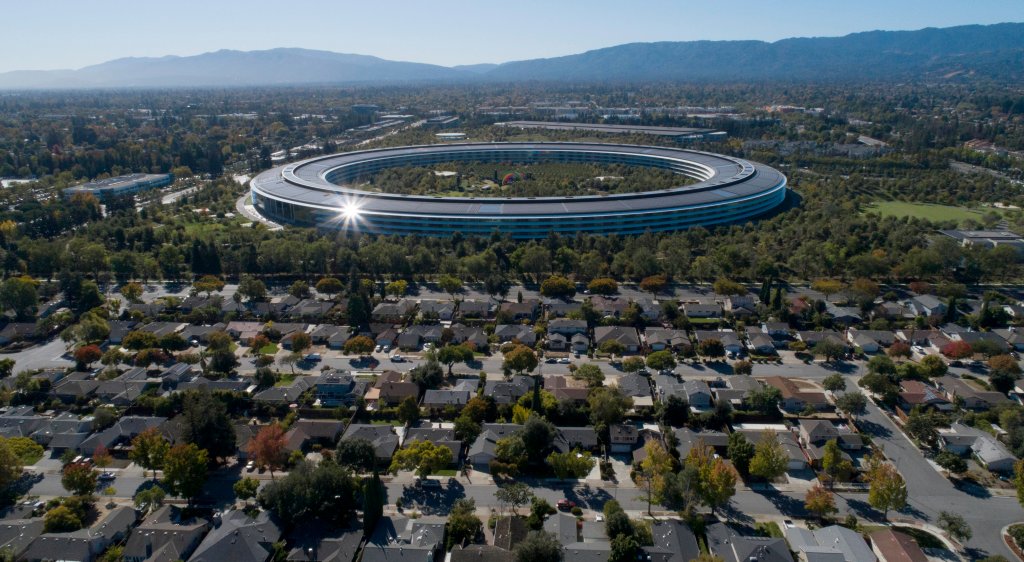CUPERTINO — In a rare move by one of Silicon Valley’s most secretive tech giants, Apple is offering its neighbors a limited-time, behind-the-scenes peek at its mysterious “spaceship” campus.
The iPhone maker is inviting residents who live near its new $5 billion Apple Park headquarters in Cupertino to a “neighborhood open house” on Saturday from 10 a.m. to 3 p.m. Neighbors received invitations — simple cards decorated with a rainbow circle and the Apple logo — by mail, urging them to RSVP for a chance to get inside the famous campus. The event may help satisfy curious local residents, while also appeasing neighbors who complained of noise, dirt and other disturbances during the years-long construction process.
“This is a great opportunity to explore and enjoy Apple Park in a relaxed setting,” according to the event webpage, accessible via a QR code in the invitation.
Apple did not comment on the open house.
Attendees must register in advance (each invite is good for four people) and will receive instructions on when to arrive. Light snacks and beverages will be served and guests may take photos of the external campus spaces, but not of the campus’ interior, according to the invite. Drones are not allowed. The invitation does not provide many details on what the afternoon’s activities will entail, but guests are urged to wear comfortable shoes.
Finished in 2017, Apple’s 2.8 million-square-foot, ring-shaped campus is a space-age vision of curved glass and metal that holds more than 12,000 employees. But while most people in the Bay Area and around the world are familiar with the building as a landmark, few other than Apple employees have ever ventured inside. In May the company treated employees to a Lady Gaga concert at the campus to celebrate finally filling the new building with workers.
Apple has a public visitor’s center and holds media events at the campus’ Steve Jobs Theater to unveil new iPhones and other products. But even though residents and some City Council members asked Apple to make part of its campus regularly open to the public — as Google did with its “Googleplex” campus in Mountain View — Apple has kept its campus closed.
“It’s a spectacular facility. I think everybody’s curious,” said Cupertino Councilman Rod Sinks, who will attend a special VIP open house at Apple Park on Friday. “People are interested in seeing what’s behind the curtain. We weren’t able to convince Apple to open up parts of the campus to make it possible for people to enjoy this on a regular basis, so I think that’s probably added to the mystique.”
But by opening its campus for a limited time this weekend, Apple is fulfilling a promise it made years ago, Sinks said. During a 2013 joint meeting of the council and planning commission, while Apple and the city were hashing out plans for the new campus, Dan Whisenhunt, Apple’s vice president of global real estate and development at the time, suggested the audience would one day get the chance to see the campus for themselves.
“I can envision, in 2016, when we do the ribbon cutting on this thing, I would love to invite you all there for a community day so you can help us celebrate,” he said.
Sinks said he is pleased Apple is honoring that intention.
“Apple can be challenging to engage,” he said. “It’s taken a while, but I’m glad to see they’re opening the campus up.”
Sinks also hopes the open house will help repair Apple’s frayed relationship with some of its neighbors. In 2017, when construction on Apple Park was finishing up, residents who lived next to the campus in Sunnyvale’s Birdland neighborhood complained about constant construction noise — sometimes lasting past midnight — light pollution, dirt and dust and flat tires from sharp objects left in the streets. Apple attempted to placate neighbors with perks like coupons for car washes.
Apple Park also sparked condemnation from some affordable housing advocates who complained that Apple’s huge new campus included no housing for its workers, further exacerbating the Bay Area’s housing shortage. And because it’s not located near any major public transit hubs, some critics complained it would make traffic on already clogged roadways worse. Apple, after years of silence on the region’s housing issues, last month pledged $2.5 billion to help residents afford housing around the state.
Despite the housing commitment and the upcoming open house, those big problems persist, Sinks said.
“The open house helps satisfy neighbors’ curiosity about the campus,” he said. “But then we go back to the persistent problems of lack of enough housing at prices that folks that don’t work at Apple can afford, and transportation.”










